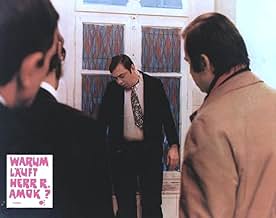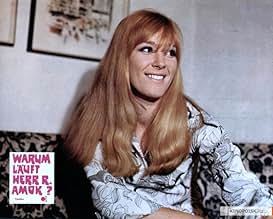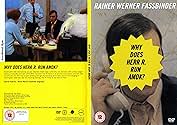Añade un argumento en tu idiomaWith slicked-down hair and three-piece suits, dependable Herr Raab is a technical draftsman. He gets along with his colleagues although his boss wants him to go beyond technical cleanliness ... Leer todoWith slicked-down hair and three-piece suits, dependable Herr Raab is a technical draftsman. He gets along with his colleagues although his boss wants him to go beyond technical cleanliness to problem solving. He's a dutiful husband; his wife's a social climber and pushes him to ... Leer todoWith slicked-down hair and three-piece suits, dependable Herr Raab is a technical draftsman. He gets along with his colleagues although his boss wants him to go beyond technical cleanliness to problem solving. He's a dutiful husband; his wife's a social climber and pushes him to seek a promotion, but they also share sweet moments. He's a caring father, helping his son... Leer todo
- Dirección
- Guión
- Reparto principal
- Premios
- 3 premios y 2 nominaciones en total
- Kollege im Büro
- (as Harry Bär)
- Opa Raab
- (as Herr Sterr)
- Oma Raab
- (as Frau Sterr)
- Schallplattenverkäuferin
- (as Carla Aulaulu)
Reseñas destacadas
The film consists largely of lengthy conversations about the most mundane of things; work, vacations, the son's school, buying a romantic record in a music store... The whole picture is also presented exclusively with long takes and hand-held cameras. The improvised nature of the conversations further adds to the strictly realist documentary-like feel of the movie, as does the intentionally dull cinematography. With such undramatic direction, the only detail to suggest the advancement of Mr. R.'s emotional alienation is Kurt Raab's subtle performance: Mr. R. alternates between sullen observing and unrestrained blabbing, and when the camera occasionally focuses on his face instead of his chit-chatting friends, one can get a creepy feel of slowly escalating anxiety inside him. Lilith Ungerer as his wife also displays faint hints of similar emotions, but keeps them tightly hidden under her shell of excruciating normalcy.
When a film is titled like this one, some kind of dramatic ending or plot twist can be expected sooner or later. Here it only happens at the very end; until the last 10 minutes or so, the film is completely G-rated. The scene preceding the twist is the best one in the whole film and achieves a very distressing atmosphere, but still, the twist itself comes across as rather predictable and even lackluster. Perhaps it is just that modern audiences have become desensitized to such incidents, but more oomph would have been needed to justify the preceding 80 minutes of practically nothing, as Mr. R.'s boredom has also become ours by the end.
Even though there's not much to see besides the lead couple's performance, I have a taste for this type of uneventful, talky cinema. Ultimately Warum... was a curious novelty to me and kept me intrigued throughout, but I'm somewhat wary of recommending it to more casual film fans; something like Michael Haneke's 71 Fragments of a Chronology of Chance could be a more easily accessible take on the subject. Then again, if you know what to expect, Warum... may also be a rewarding experience in mundanity that many can surely identify with – you have to make up your own mind based on your tastes.
Here, in opposition to his more characteristically considered style, a shaky hand-held camera eavesdrops on the eponymous Herr R.(played to perfection by the great Kurt Raab) who is tediously seen at his work, with his wife, during a visit from his parents and the like, while slowly unwinding inside.
Long takes predominate and we are also let into the life of Herr R.'s pretty but equally vapid wife for whom he, in a most affecting scene, buys a record without knowing the singer or song title - much to the shameless merriment of the shop-girls who serve him. Fassbinder keeps the tension tightly wound throughout and it is this knowing sense of what to show and when to withhold that gives the greatest indication that this is the work of a man who was to become one of Europe's greatest film-makers since Ingmar Bergman.
No doubt, many will find the extreme sense of realism and boredom too oppressive but 'Herr R.' has proved to be highly influential on a much later generation of film-makers and still retains the power to provoke and unsettle.
Another problem, perhaps in a certain perspective even more delicate, is the border between a deed in thought and a deed in fact. Many people kill others in their wishes, dreams, they even say it without meaning it. On the other hand, some people would never say it, but then there is a moment when they do it. What is it that causes the transgression between thought and deed? R.W. Fassbinder presents a fully uncommented, non-condemnatory approach in "Warum Läuft Herr R. Amok?" (1970). Up to a certain degree, the absolute free speech which gives the illusion of everyday-conversations observed by a candid camera, has the form of a Brechtian "Lehrstück", however, there is no wagging finger to sense in this movie. The spectator is elevated into the position of the judge - if he really still thinks that the deed of Herr R. can be judged after having watched and understood the movie. The spectator even becomes a part of the movie, without him the communication scheme is incomplete. He is the receiver of a message from whom not even an answer is expected, but a revision in thinking on the basis of which has been presented to him. "A good movie is a movie that does not stop when people come out of the cinema, but continues in their heads", Fassbinder said once.
Although Fassbinder is credited as writing and directing this film, it has since come to light that he probably did neither. The writing was largely improvisation, and the directing was exclusively Michael Fengler (a longtime Fassbinder collaborator).
Frankly, I am glad that this is not a real Fassbinder because he makes some excellent movies... but, for me, this would not be one of them. It just runs on, with people rambling for the entire duration. The reviews tend to be positive, but I see it as a film where nothing happens. And not in a funny way, just in a very pointless way.
¿Sabías que...?
- CuriosidadesIn 2003 on a interview for Village Voice Hanna Schygulla claimed that this film was completely done by director Michael Fengler, whereas purported co-director Rainer Werner Fassbinder had nothing to do with the actual film. She also claimed that film was almost completely improvised which wasn't Fassbinder's way to make movies. Fassbinder still is credited as director and writer on the actual film and on many official sources, including Fassbinder Foundation's website. This fact has been confirmed by Michael Fengler himself in the 2008 documentation Gegenschuss - Aufbruch der Filmemacher (2008). He reported, that Fassbinder was involved neither in writing nor in directing of the movie and has visited the movie set at most twice during shooting.
- PifiasWhen Herr R. leaves the doctor the camera team can be seen in the mirror on the wall.
- ConexionesFeatured in Sehnsucht nach Sodom (1989)
Selecciones populares
- How long is Why Does Herr R. Run Amok??Con tecnología de Alexa
Detalles
- Fecha de lanzamiento
- País de origen
- Idioma
- Títulos en diferentes países
- Why Does Herr R. Run Amok?
- Localizaciones del rodaje
- Müllerstraße 40, Múnich, Baviera, Alemania(bureau, Franz Maron, Architekt/Dipl. Ing.)
- Empresas productoras
- Ver más compañías en los créditos en IMDbPro
Taquilla
- Presupuesto
- 135.000 DEM (estimación)
- Duración1 hora 28 minutos
- Mezcla de sonido
- Relación de aspecto
- 1.37 : 1
Contribuir a esta página






























